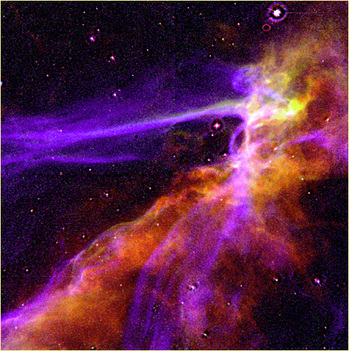By Mark Hughes on October 20, 2010 6:40 PM
A singularity, tiny beyond comprehension, burst forth with power and energy. In seconds, the foundation for reality and existence in our universe were created. Only Hydrogen and Helium existed as elements. They formed stars.
Eventually, those stars died. Some collapsed and became black holes, singularities working in the reverse of the one that raptured outward to form our universe, instead gobbling up all reality around them. Other stars broke down and exploded, hurtling their essence further into the universe that still grew and expanded and changed around them.
That essence, that dust from the stars, contained new elements, elements formed within the heart of the stars. This star dust, these new elements, formed everything else in the universe. Planets formed, rocks formed, water formed.
And life formed. Life composed of elements born in the heart of the first stars, stars themselves formed from the birth of our universe.
Life no doubt formed all around our universe, including probably on a planet in the Gliese 581 star system. And of course, life formed right here on Earth. Microbes, multi-celled organisms, complex organisms, in the oceans and then crawling out onto land and evolving into all manner of living creatures. On a planet changing radically over millions of years, struck by massive impacts from asteroids and comets, one so large it knocked part of the planet loose and formed our moon.
Life here evolved and became self-aware, stood on hind legs, grunted and then spoke. Looked up into the sky at night, saw the stars, and wondered about our own origins.
We were born out there among the stars, starting in that first instant when the singularity expanded and birthed stars that birthed everything else that became life that looked up into the sky and that finally understood. From a single point to a universe, from stars to stardust to life. From simple life to complex self-awareness.
And meanwhile, still out there, those stars that fell into themselves and formed black holes? They feed on this universe’s leftovers, filling up one side of a singularity that many researches now strongly suspect opens up and spits back out that energy and mass into brand new universes just like our own. The laws pass from one to another, the first stars form again and then in their hearts form the ingredients for the rest of the universe, and once more forming life that will some day look up and understand it all.
Our singularity was probably born that same way, the back door so to speak of a singularity in some universe that already existed long before our own was formed. Our universe was fed by that older universe, the laws passing through to us.
Universes form, inherently forming stars that inherently form the rest of what is needed for a universe, and those stars explode sometimes and collapse other times. And some of the collapsed ones form new singularities birthing more universes, birthing more stars to birth more universes, on and on. Each time, too, some stars birth life. Life that eventually must become self-aware and must eventually comprehend these basic concepts — the simple law of averages says life will exist, and some of that life will understand.
Life is sort of the consciousness of the universe, the way a universe can be aware of its own nature, it’s own past, and you might even say it’s own “purpose” — to reproduce, to make more, to keep understanding.
Think about the odds, the complexity, the beauty and perfection in this. A singularity, a universe, stars, stardust, life, a black hole, a new singularity, a new universe, new stars, new stardust, new life, forever and ever. And we sit here able to understand it, to tell others about it, to look up into the night sky at the stars and know “That’s where we came from, that’s where we’ll go some day, and there are other living things looking up into their own night sky out there around those stars right now thinking the same thing.”
We don’t have to look up and feel insignificant — we are more significant than we can ever probably truly appreciate, as the consciousness of all that exists. We are part of it, part of not only this world but all worlds.
Now tell me — what miracle could be more awe-inspiring than that?
Knowing and believing these things, the idea of a God having made everything would actually be a let-down, wouldn’t it?
This comment was posted on my blog entry here.












